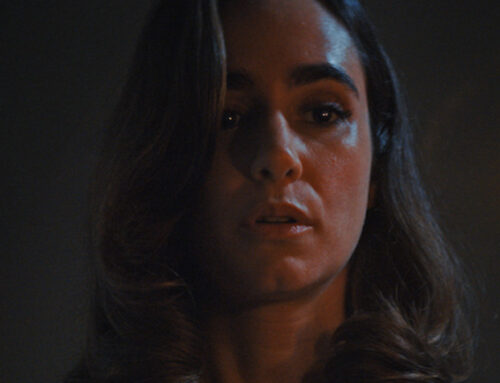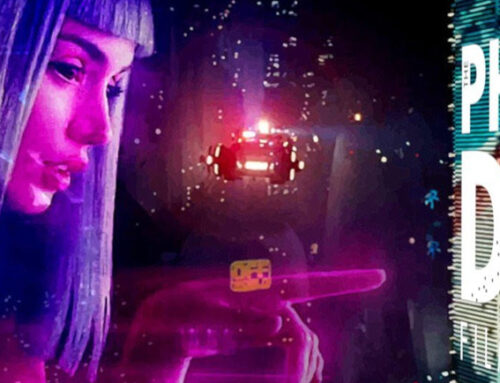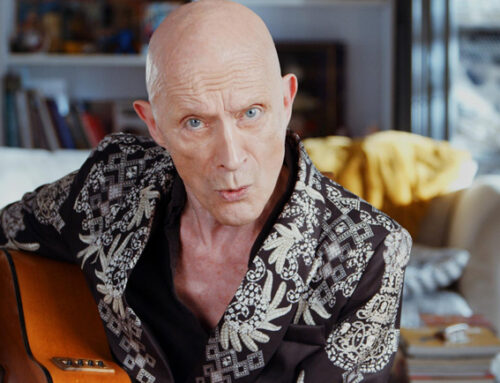If you had a serial killer living on the same floor as you, wouldn’t you want to know? That’s the question in Paramount Movies’ new horror/thriller Depravity. The official synopsis reads: When three residents suspect their reclusive neighbor is a serial killer, they break into his apartment only to uncover a hidden fortune in stolen art. But their discovery turns into a nightmare as they’re ensnared in a sadistic game of survival, where every corner hides a new horror. Outsmart the killer or become his next victim.
Directed by Paul Tamasy, the film stars Taylor John Smith, Victoria Justice, Devon Ross, Alex Roe, Adam Lazarre-White, with Sasha Luss & Dermot Mulroney. Serving as the film’s composer is Joseph Metcalfe, who was actually introduced to the script eight years ago when playing football (soccer) with Paul. After having a lot of time to experiment with different sounds, Joseph landed on a tone that’s both dark and atmospheric. When discussing the score Joseph says, “It builds tension and plays with emotional unease, matching the film’s unpredictable twists and turns.” In the below conversation, Joseph discusses all this and much more.
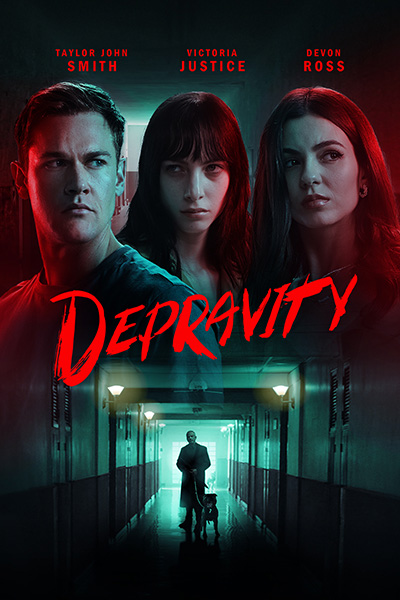
Depravity is available now on VOD.
-What did preproduction look like for you on Depravity?
Preproduction for Depravity started well before filming. Paul Tamasy introduced me to the script about eight years ago, and we began discussing musical ideas early on. One of Paul’s initial references was The Shining, which helped set the tone for some of the concepts we worked on. We even created rough tracks for the actors to use during filming in Thailand, which gave them a sense of the emotional atmosphere. These early sketches weren’t final, but rather templates to help us shape the emotional cues. Paul also curated a temp track while editing, and we turned those into a cohesive musical language that guided the final score.
-How would you describe your score to Depravity?
The score for Depravity is dark, atmospheric, and psychological. It builds tension and plays with emotional unease, matching the film’s unpredictable twists and turns. Each character has a theme that evolves as their journeys intertwine, and the music uses layers of unsettling strings and ambient tones to heighten the suspense. This is a score that mirrors the characters’ psychological struggles while enhancing the film’s emotional intensity.
-Were there any scenes in the film that were more challenging than others to score? If so, why?
Rather than finding the score difficult, the challenge was more about not giving away too many clues too early. We wanted to create a subtle sense of innocence at the beginning, even though each character brought their own complex backstories into the narrative. The title theme was not the original piece I wrote. Initially, I composed something bigger that set a more terrifying tone. However, I felt that starting too big didn’t leave room for the score to grow. So, after discussing with Paul, we chose an approach that leaned more into the psychological, subtly introducing the character themes without overpowering the early moments. Communication was key, and by the time I started scoring, the emotional direction was clearly defined, making the process smooth.
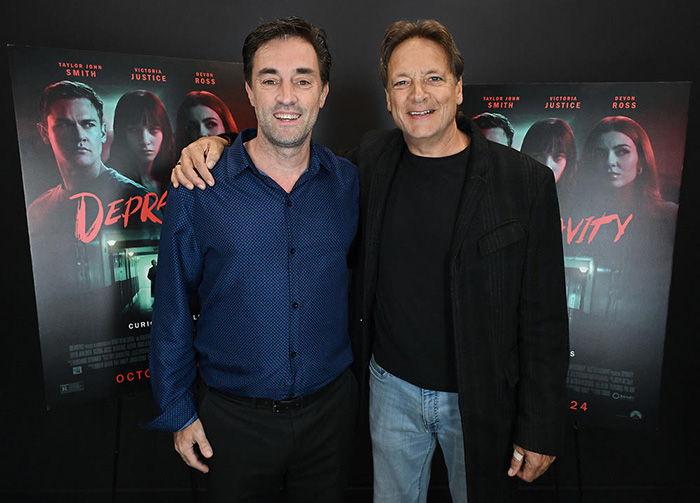
Joseph Metcalfe (Left) and director Paul Tamasy (Right), photo by Kevin Parry
-Did the director, Paul Tamasy, have a clear idea of how he wanted the score to sound or were you able to experiment more?
Paul had a strong vision for how he wanted the score to connect with the characters and the story. He often knew exactly how he wanted certain scenes to link musically, ensuring that subtle clues tied together across the film. At the same time, he was open to experimentation, and we collaborated closely, bouncing ideas back and forth until we arrived at something that worked. His deep experience as a writer and director made the communication seamless, allowing us both to be creative while staying true to his vision.
-Are there any jump scares in Depravity? If so, how do you approach those, musically?
There are a few jump scares in Depravity, but the film doesn’t rely on them to get inside your head. The plot itself creates a psychological tension, making you think about what you’d do in those situations. There are definitely moments where you think, “I didn’t see that coming,” and I made sure not to lead into those moments in a way that would give them away. Musically, I build tension subtly without tipping off the audience. For jump scares, I often use sudden dynamic shifts or abrupt silences followed by jarring sounds, but in Depravity, the score focuses more on psychological buildup than shock value.
-What instruments have you found make the most terrifying sounds? Did you get to use any of those in the Depravity score?
I’m a huge believer that the music shouldn’t pull you from the film so if there’s anything that draws attention to the music, I’ve not done my job properly. One sound that unsettles people is scratching, be it fingers down a chalkboard to scratching any unusual objects, be it piano strings, twisted wires, bowing slate or tiles… thanks to the percussion section who like to make any noise they can. In this score I used unconventional playing of the erhu for Depravity, creating unsettling textures through string scratches and dissonant harmonics. Fortunately, there are a lot of libraries that allow manipulation of their sounds to create new sounds of tension, but it had to blend and not stand out from the score as this isn’t a film that slams the horror in your face.
-Did you lean towards one instrument more than others for the Depravity score?
The erhu played a central role in creating the eerie, psychological tone of the score, but there was also a significant balance between live and synthesized performances. In the string sections, we played around with techniques like bouncing bows on the strings or introducing dissonance while the rest of the strings maintained harmony. This subtle tension added to the unsettling feel of the music. The hybrid performances helped to create the right blend of atmosphere and emotional depth.
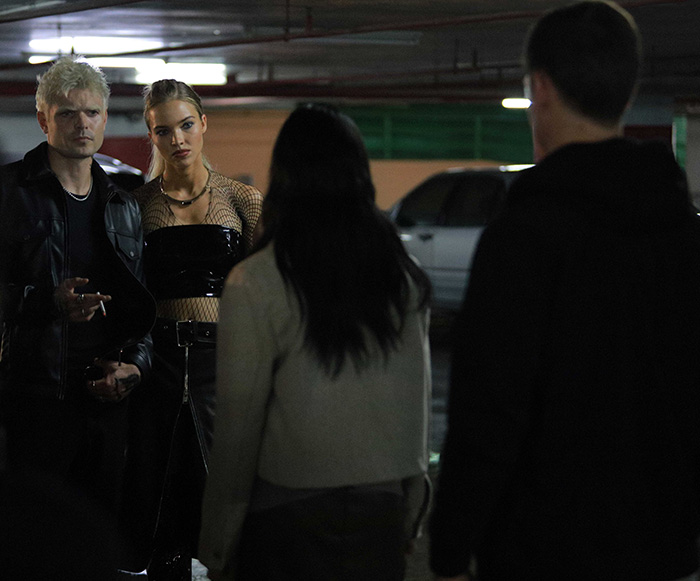
-Depravity isn’t your first horror film to work on. Do you find you get to experiment more with horror? How have your horror projects been different than non-horror?
Horror gives a lot more room for experimentation than other genres. You can push boundaries, explore unconventional sounds, and even blur the lines between music and sound design. With horror, the music often plays a more psychological role, manipulating the audience’s emotions in ways you can’t with other genres. Non-horror projects usually stick to more traditional musical structures that complement the story, but horror invites you to create something abstract and disorienting. In Depravity, I leaned into these psychological aspects to enhance the suspense and unease.
-Are you personally a horror fan? If so, do you have a favorite horror film that made a lasting impression on you?
In my younger years, I loved Poltergeist, which had a lasting impact on me—especially since I was later mentored by Jerry Goldsmith, who composed the score for that film. I have enjoyed a mix of cheesy horror and deeply psychological productions, but above all, I love films that stay with you for days because of their strong production values and storytelling. I’m a big fan of horror that keeps the enemy hidden, forcing the audience to use their imagination. Depravity falls into this category—it’s a more cerebral, psychological kind of horror that leaves much for the audience to ponder, rather than relying on overt scares.


